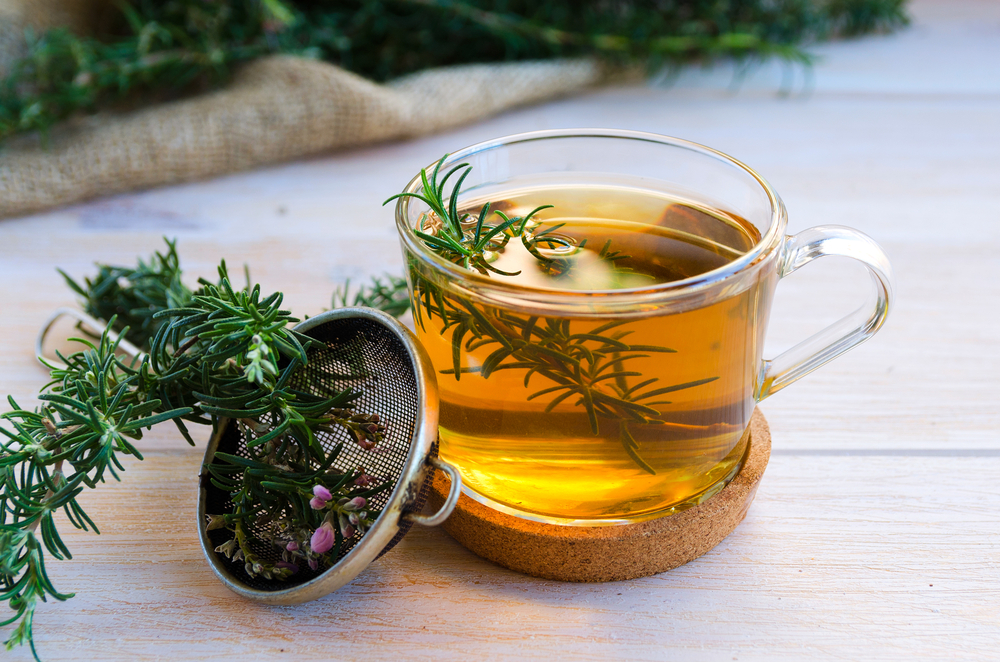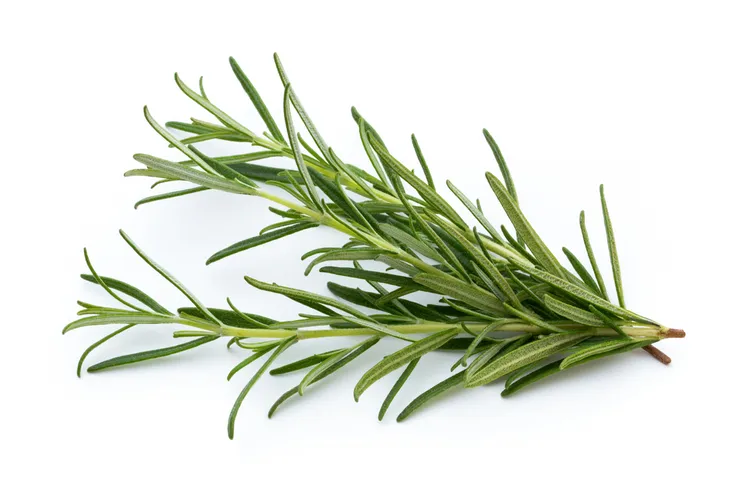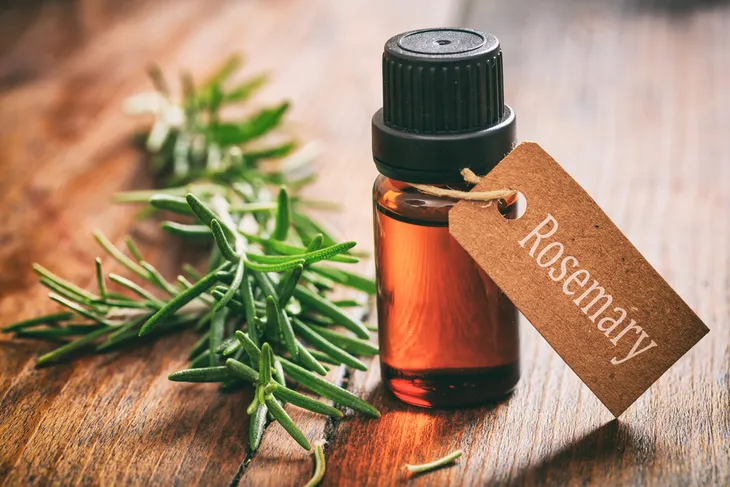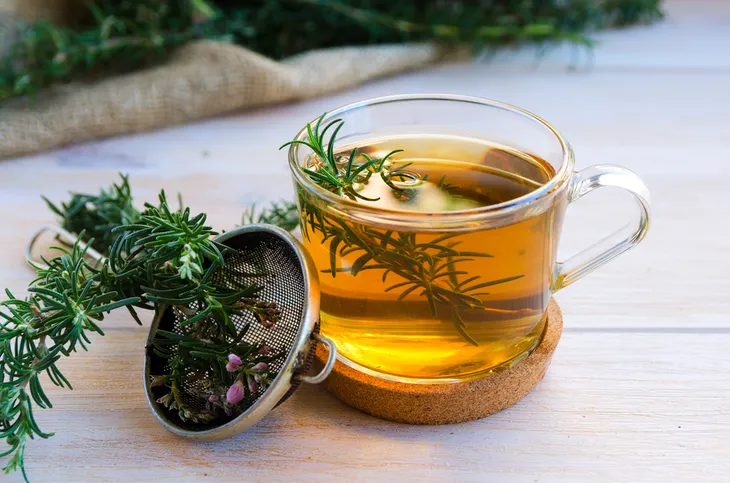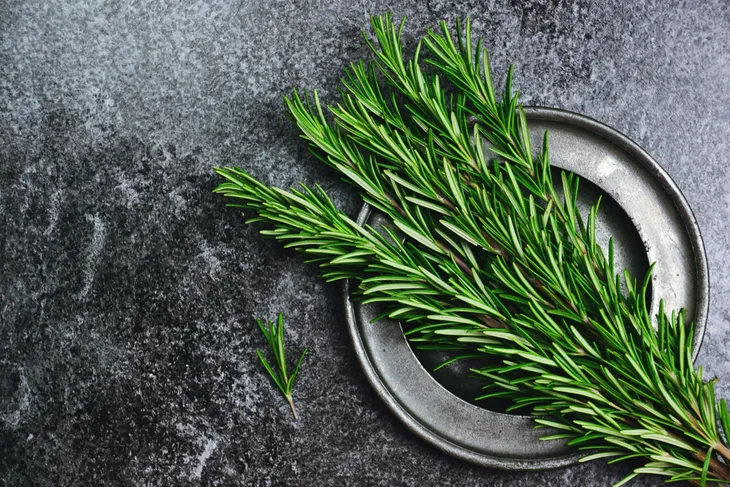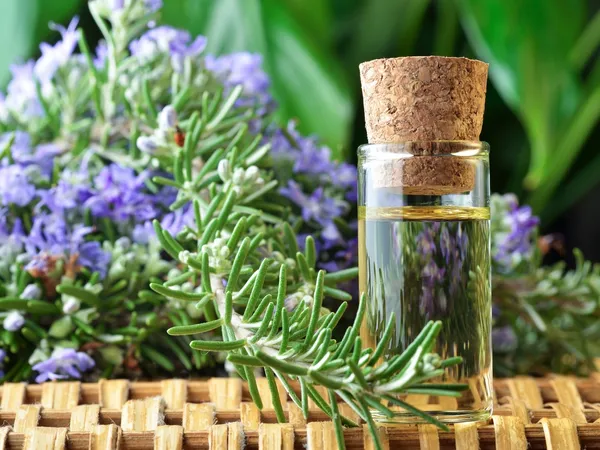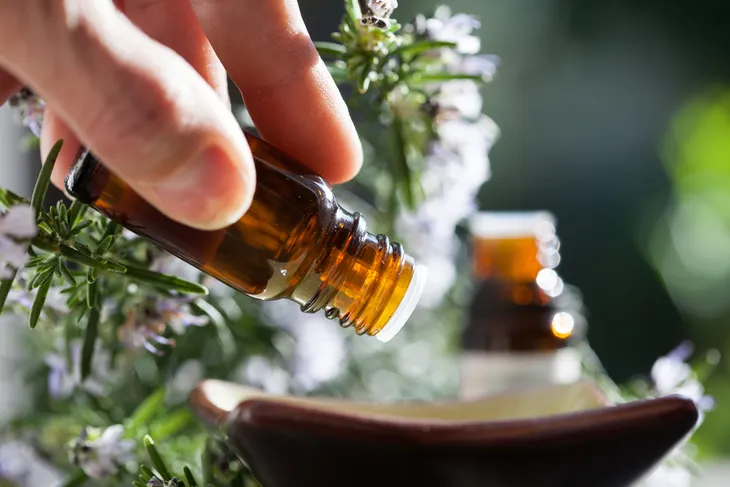Dried or used fresh in culinary dishes or extracted as an oil and used in hand creams, soaps, and applied topically to treat chronic dry skin (eczema) and ward off insects—it would seem that rosemary has limitless uses.
Let’s find out the true health benefits this fresh, pine-filled herb…
The Origin of Rosemary
Rosemary, or Rosmarinus officinalis, grows as a woody, perennial evergreen shrub with pink, purple, blue, or white flowers. This fragrant herb is native to the Mediterranean and Asia, where it’s long been a triple threat as far as its many culinary, aromatic, and therapeutic purposes.
A popular fragrance, rosemary oil is often applied as a perfume, dispersed in air fresheners, burned as incense, and infused into body creams, shampoos, and cleaning products for its pleasing pine and subtle peppermint scent.
Rosemary in Folklore
In the Middle Ages, rosemary was considered a powerful love charm. Herb sprigs were worn in the bride’s headpiece, in the groom’s lapel, and donned by wedding guests as symbols of love and luck.
Therapeutically, rosemary has been used for thousands of years as a traditional medicine to treat digestive woes, remedy gout, boost cognitive function, and banish insects.
Rosemary for Blood Circulation
Research from the “Journal of Neurochemistry” and the “Journal of Medicinal Food” credit rosemary with improving brain circulation and preventing Alzheimer’s disease.
The herb’s rich phytochemical content—particularly in a potent antioxidant known as carnosic acid—helps protect the body from free radical DNA damage and wards off both cancer and heart disease.
Medical Precautions
Of course, for safety reasons I always recommend discussing all herbal therapies with your health care professional prior to usage. For instance, research from the University of Maryland Medical Center indicates that rosemary can interact badly with medications.
Common prescription drugs such as lithium, diuretics, blood thinners, and ACE inhibitors all have a history of interacting negatively with the herb. In addition, experts from WebMD note that pregnant women should avoid large quantities of rosemary as the herb can act as a powerful uterine-stimulator.
Culinary Uses for Rosemary
In the kitchen, the fresh and dried rosemary leaves (or needles) are often used to flavor roast meats, stuffing, and Italian dishes. Due to the slightly bitter tang of this herb, rosemary is often reserved for roasted, barbecued, and baked cuisine as opposed to raw dishes.
Rosemary can also be steeped into an herbal tea, purportedly to help aid digestion after a large meal, ease headaches, and even improve memory function.
Fights Signs of Aging
According to Style Craze, rosemary contains antioxidants and antimicrobial phytochemicals that work to help keep our skin looking healthy, especially as we age! Drinking rosemary in the form of tea or applying it as a topical cream can help fight “bacterial or fungal infections, lesions, acne, and blisters.”
The rosmarinic acid in rosemary works to “eliminate free radicals that cause wrinkles, fine lines, and pigmentation.” In addition to all of this, rosemary also helps tighten any sagging skin, and keep skin looking fresh and glowing.
Fights Infection
Similar to many other herbs, rosemary is great for the immune system. “This is due to the anti carcinogenic, anti-inflammatory and antioxidant properties it has. It can enhance your overall health as it has many healing powers,” says Style Craze.
Improve Memory and Concentration
The use of rosemary dates back thousands of years! The herb is mentioned in folk medicine as a treatment for memory, and Mother Nature Network writes that students in ancient Greece would wear rosemary sprigs in their hair while studying for tests.
While it’s rumored that rosemary can have a positive effect on our memory, the question of whether its effects are on quality, speed, or both, are still being debated. WebMD notes that early evidence of rosemary aromatherapy shows it has the ability to improve the quality of memory, but not the speed. On the other hand, it also states that taking 750 mg of powdered rosemary leaves in tomato juice “might improve memory speed in healthy, older adults,” but a high dosage could make it worse.
Ease Stress
It’s widely known that certain herbs can be useful to alleviate stress, but is rosemary one of them? When it comes to drinking herbal rosemary tea, a 2015 study in the U.S. National Institutes of Health’s National Library of Medicine says it is. This particular study found that the rosemary tea worked to manage burnout levels among employees and reduce their anxiety. How does it work? The ursolic acid and rosmarinic acid in rosemary contain antidepressant effects.
While we know that drinking rosemary tea can have its benefits, according to WebMD, the question of aromatherapy is still up in the air because “some evidence suggests that rosemary and lavender oil may reduce pulse rates, but not blood pressure, in people taking tests.” On the other hand, a study conducted by the University of Maryland Medical Center (UMM) did find that rosemary in combination with other oils, worked to possibly lower cortisol levels, which led to lowered anxiety. But, there are studies that have proven when rosemary oil is directly applied to the wrist, it could actually increase anxiety while writing a test.
Fights Hair Loss
Rosemary has long been used by cultures to improve hair growth. It is often applied as a topical treatment to the skin when preventing and treating baldness. “Early evidence shows that applying rosemary oil with lavender, thyme, and cedarwood oils to the scalp improves hair growth,” says WebMD.
Mother Nature Network cites one particular study where people suffering from alopecia areata (where the hair falls out in patches), found significant regrowth after massaging their scalps with rosemary and other oils, in comparison to those who didn’t. Because the study was poorly designed, according to University of Maryland Medical Center, it’s still unclear how exactly rosemary works to improve hair loss and whether it was responsible for hair growth at all.
Improve Digestion
Style Craze says rosemary is effective at improving digestion after reading a 2014 study on how rosemary extracts affect body-weight, energy metabolism and inflammation properties in animal models. The study showed rosemary tea works to support the growth of important bacteria in our gut “which helps in selective absorption of fiber and breakdown of lipids. This prevents obesity.” To support this argument, the University of Maryland Medical Center has listed rosemary leaf as an approved treatment by the German Commission E (a government regulatory agency that examines the safety of herbs) for indigestion.
So how should we reap the benefits of rosemary tea? The best way to capitalize on its benefits is to drink a cup of rosemary tea after eating a large meal, or whenever you’re feeling a little bloated. The tea works to relax the muscles in the gastrointestinal system and help move along the digestion process. It can also be used to soothe any discomfort from dyspepsia, constipation, or other digestion issues.
Lower Cancer Risk
There has been an extensive amount of research conducted around the subject of cancer, including whether rosemary extract could help prevent, or stop the spread of cancer. These studies specifically looked at its effect on cancerous cells, and whether rosemary could stop them from replicating and tumors from growing.
According to MNN, there was one particular study that found rosemary, on its own and in combination with curcumin, could be helpful in preventing breast cancer. Another study found similar results with rosemary and the cell replication of colon cancer.
Boosts Energy
We all need a little help with our energy levels from time to time. Some of us turn to a freshly brewed coffee, while others opt for a caffeinated tea. Good news for those who don’t like either of these morning beverages, because we might have found the perfect cure!
A 2013 study published in the U.S. National Institutes of Health’s National Library of Medicine found that merely the smell of rosemary oil increases “blood pressure, heart rate, and respiratory rate.” After inhalation, the results showed that subjects were more active and felt “fresher.” It also helped remove feelings of boredom by providing a “fresher mental energy.”
Muscle Pain
Arthritis is an extremely painful condition that results from the inflammation of joints. Luckily, rosemary has powerful antioxidants and anti-inflammatory effects that can help treat inflammation. Superfoods Scientific Research refers to a study published in the 2007 edition of Canadian Journal of Physiology and Pharmacology, which showed “rosemary, in combination with other plants, was an effective way to lessen pain in individuals who suffer from osteoarthritis. Applied topically, rosemary oil is used to treat muscle pain and arthritis and to improve circulation.”
“Early research shows that taking a product containing rosemary, hops, and oleanolic acid (NG440 or Meta050) can reduce pain associated with arthritis,” says WebMD. In Germany, the Commission E has approved rosemary oil as a topical treatment for muscle pain and arthritis.
